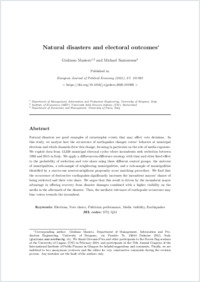Natural disasters and electoral outcomes
- Masiero, Giuliano Department of Management, Information and Production Engineering, University of Bergamo, Italy - Istituto di economia politica (IdEP), Facoltà di scienze economiche, Università della Svizzera italiana, Svizzera
- Santarossa, Michael Department of Economics and Management, University of Pavia, Italy
-
04.12.2020
Published in:
- European Journal of Political Economy. - Elsevier. - 2021, vol. 67, p. 19 p
English
Natural disasters are good examples of catastrophic events that may affect vote decisions. In this study, we analyze how the occurrence of earthquakes changes voters' behavior at municipal elections and which channels drive this change, focusing in particular on the role of media exposure. We exploit data from 13,338 municipal electoral cycles where incumbents seek reelection between 1993 and 2015 in Italy. We apply a difference-in-difference strategy with time and cities fixed effect to the probability of reelection and vote share using three different control groups: the universe of municipalities, a sub-sample of neighboring municipalities, and a sub-sample of municipalities identified by a one-to-one nearest-neighbour propensity score matching procedure. We find that the occurrence of destructive earthquakes significantly increases the incumbent mayors' chance of being reelected and their vote share. We argue that this result is driven by the incumbent mayor advantage in offering recovery from disaster damages combined with a higher visibility on the media in the aftermath of the disaster. Thus, the mediatic relevance of earthquake occurrence may bias voters towards the incumbent.
- Language
-
- English
- Classification
- Economics
- License
-
License undefined
- Open access status
- green
- Identifiers
-
- RERO DOC 330891
- DOI 10.1016/j.ejpoleco.2020.101983
- ARK ark:/12658/srd1319380
- Persistent URL
- https://n2t.net/ark:/12658/srd1319380
Statistics
Document views: 307
File downloads:
- Fichier principal: 645
